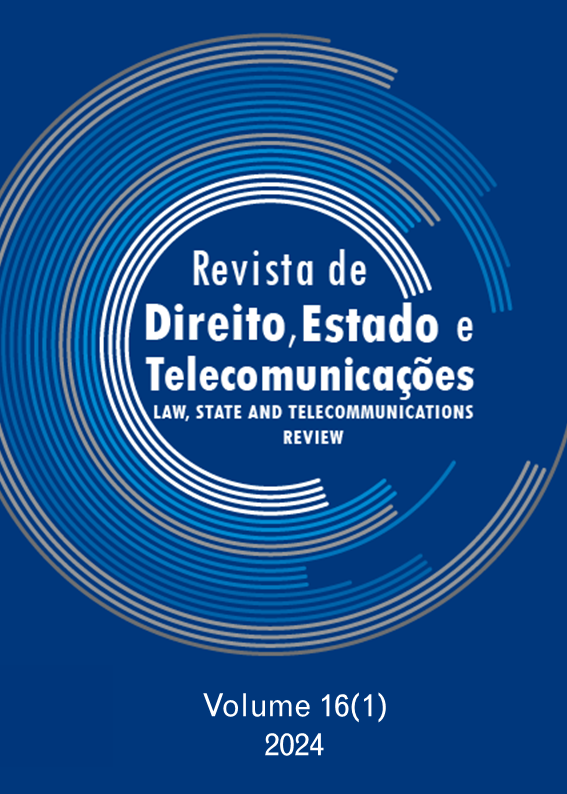Constitutional Constraints on Regulatory Asymmetries in Telecommunications Regulation in Brazil
DOI:
https://doi.org/10.26512/lstr.v16i1.53741Palabras clave:
Anatel. Regulatory asymmetries. General Regulation of Consumer Rights for Telecommunication Services. Small Providers. Responsive regulation.Resumen
[Purpose] This article aims to analyze the legal-constitutional validity of the new wording of the General Regulation of Consumer Rights for Telecommunication Services (RGC) as a measure of regulatory asymmetry promoted by the National Telecommunications Agency (Anatel).
[Methodology/approach/design] To this end, we examine the role of the Agency as a normative agent empowered to establish asymmetries in the regulation of the sector, which, however, must respect the principles of equality, free competition, consumer rights, and the core essence of weighted rights.
[Results] The analysis of the existing asymmetries shows that the majority of telecommunications services users in Brazil are not protected by the RGC. As a consequence, the RGC either does not recognize rights considered essential to them, or creates rights of enjoyment considered superfluous, burdening only the major operators. Consequently, the measure is not in line with the responsive regulation model adopted by Anatel.
[Practical implications] The article points to the need to review either the regulatory asymmetries granted to Public-Private Partnerships (PPPs), as they are, in fact, institutional guarantees for consumer protection and therefore non-negotiable, or the regime of rights and obligations imposed by the RGC on providers as a whole, which requires compliance with measures that, not being essential to consumers, could not be demanded from operators in general.
Referencias
ARAGÃO, A. S. Direito dos serviços públicos. 3ª ed. Rio de Janeiro: Forense, 2013.
_____. Serviços Públicos e Concorrência. Revista de Direito Administrativo – RDA. Rio de Janeiro: v. 233, jul./set. 2003.
ARANHA, M. I. Interpretação Constitucional e as Garantias Institucionais dos Direitos Fundamentais. São Paulo: Atlas, 1999.
_____. Manual de Direito Regulatório: Fundamentos de Direito Regulatório. Londres: Laccademia Publishing, 2023.
AYRES, I.; BRAITHWAITE, J. Responsive Regulation: Transcending the Deregulation Debate. Oxford: Oxford University Press, 1992.
BALDWIN, R.; BLACK, J. Really Responsive Regulation. LSE Law, Society and Economy Working Papers, Londres, v. 15, p. 1-47, 2007.
BARROSO, L. R. A ordem econômica constitucional e os limites à atuação estatal no controle de preços. Revista de Direito Administrativo, Rio de Janeiro, v. 226, p. 187-212, out./dez. 2001, p.203-206.
_____. Agências Reguladoras. Constituição, Transformações do Estado e Legitimidade Democrática. In.: BINENBOJM, G. (coord.) Agências Reguladoras e Democracia. Rio de Janeiro: Lumen Juris, 2006.
BINENBOJM, G. Assimetria Regulatória no Setor de Transporte Coletivo de Passageiros: a constitucionalidade do art. 3° da Lei n° 12.996/2014. Revista de Direito da Cidade, Rio de Janeiro, v. 9, n. 3, 2017, p. 1274.
BLANCHET, L. A., GAZOTTO, G. M., FERNEDA, A. S. Sandbox regulatório e tecnologias disruptivas: incentivos à inovação e inclusão financeira por meio das Fintechs. Revista Eurolatinoamericana de Derecho Administrativo, 7(2): 71-87, jul./dez. de 2020.
BRAITHWAITE, J. Evidence for Restorative Justice. The Vermont Bar Journal & Law Digest, v. 40, p. 18-22, Summer 2014.
FREITAS, L. C.; MOURA FILHO, R. N.; STANZANI, J.; MOREIRA, R. M.; MORAIS, L. E. Obrigações de fazer em sanções regulatórias no Brasil: aplicação ao setor de telecomunicações. Revista de Direito, Estado e Telecomunicações, v. 11, n. 2, p. 71-86, outubro 2019.
FRIEDEN, R. Wither convergence: legal, regulatory, and trade opportunism in telecommunications. Santa Clara Computer & High Tech Law Journal, v. 18, 2002.
HESSE, K. Grundzüge des Verfassungsrechts der Bundesrepublik Deutschland. Heidelberg: C.F. Müller Verlag, 1999.
KLEIN, A. L. O porto organizado como bem público e a delimitação de sua área. In.: PEREIRA, C.; SCHWIND, R. W. (Org.). Direito Portuário Brasileiro: Lei 12.815 - Poligonal, Arrendamento e Autorização, Arbitragem. São Paulo: Marcial Pons, 2015.
LYON, T.; HUANG, H. Asymetric Regulation and incentives for innovation. Industrial and Corporate Change, v. 4, n. 4, 1995.
MARQUES NETO, F. A. Limites à abrangência e à intensidade da regulação estatal, Revista de Direito Público da Economia, Belo Horizonte, n. 1, 2003.
_____; FREITAS, R. V. Uber, Whatsapp e Netflix: os novos quadrantes da publicatio e da assimetria regulatória. Revista de Direito Público da Economia, Belo Horizonte, ano 14, n. 56, p. 75-108, out./dez. 2016.
_____; ZAGO, M. F.. Limites das assimetrias regulatórias e contratuais: o caso dos aeroportos. Revista de Direito Administrativo, Rio de Janeiro, v. 277, n. 1, p. 175-201, jan./abr. 2018.
WEISMANN, D. L. Default capacity tariffs: smoothing the transitional regulatory asymmetries in the telecommunications market. Yale Law Journal on Regulation, v. 5, 1998.
WINTER, E. L. S. Sandbox Regulatório e os desafios das Fintechs. Revista de Estudos Jurídicos UNA 5(1): 60-73, 2018.
Descargas
Publicado
Número
Sección
Licencia
Derechos de autor 2024 Law, State and Telecommunications Review

Esta obra está bajo una licencia internacional Creative Commons Atribución 4.0.
Al enviar este documento a la Revista de Derecho, Estado y Telecomunicaciones,
declaro que estoy aceptando los términos de Creative Commons Attribution 4.0 International (CC BY 4.0)


